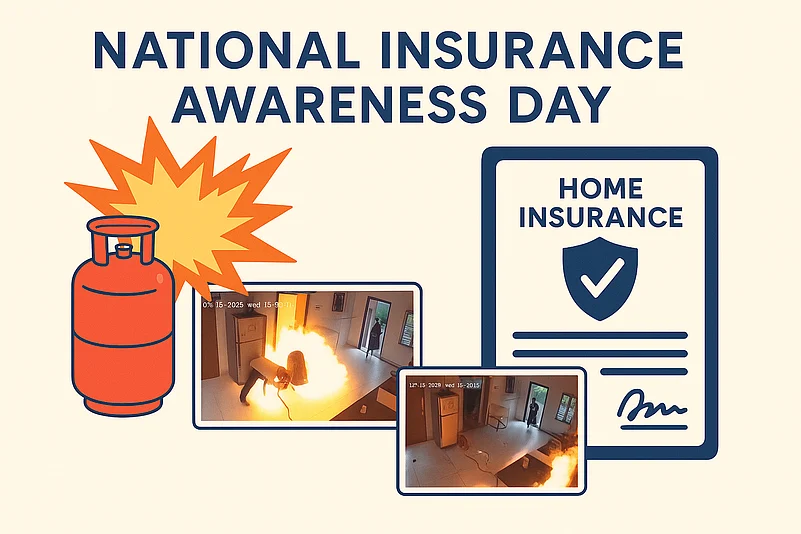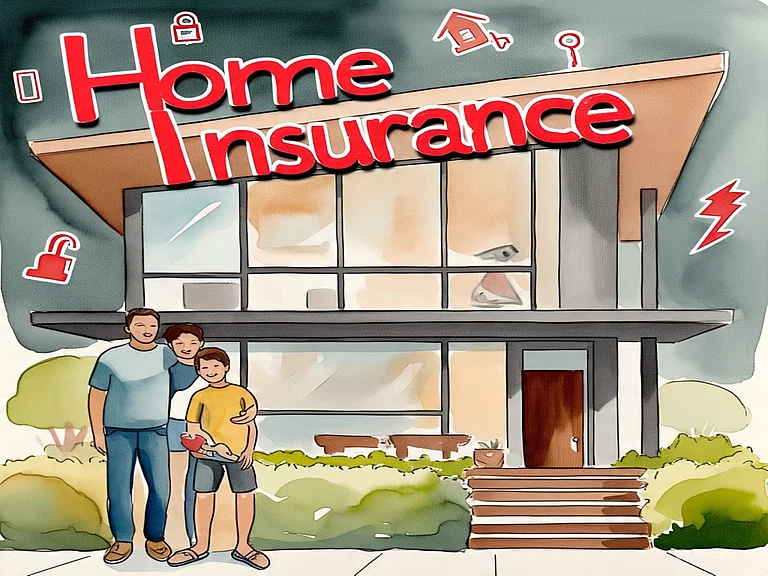A video went viral earlier this week showing a massive LPG-cylinder explosion in a house. A man and a woman caught in the moment somehow made it out just in time; otherwise, it could have easily ended in a tragedy. And while this particular explosion didn’t take lives, it left behind something else: yet another reminder of how fragile domestic safety really is.
We tend to focus on what could have gone wrong in such accidents, the loss of life, the physical damage, the sheer panic. But there is a quieter, less visible cost too. For many families, one such incident is enough to wipe out years of savings. And in most Indian homes, there is little safety net.
On National Insurance Awareness Day, it is important that we discuss the role of home insurance, which continues to be ignored or misunderstood, even as risks at home are only one such accident away.
What actually happens after a domestic explosion?
According to Krishna Kumar Pathipaka, who heads Property and Engineering Claims at Digit Insurance, the first thing to do after such a blast is to inform the LPG distributor or the relevant oil company. This is not just for paperwork; it triggers an official investigation.
If it turns out the cylinder or its fittings were faulty, compensation comes through a public liability insurance policy maintained by oil companies. This usually covers damage to property and injury-related medical expenses. In more serious cases, it can also compensate for loss of life.
But it is not always that straightforward. If the damage is too extensive or if the cause does not fall under what the public liability policy covers, families are often left to deal with the fallout themselves unless they have separate home insurance.
How Home Insurance steps in
Some home insurance policies cover household explosions, including ones triggered by LPG leaks. This means if your walls are blown out, your ceilings collapse, or your belongings are burnt or shattered in the process, your insurer can step in to pay for repairs or replacements.
Everything depends on how much coverage you have taken and how the claim is reported.
There is usually a survey of the damaged site. Based on that, the insurer decides whether to pay the full sum insured or reimburse based on the extent of damage. You can also opt for an add-on that covers accidental injury or death in case you or your family members are harmed during the blast.
But, and this is important, you will only get the full benefit if your policy is active, the details are up to date, and the cause of damage is not excluded under the terms.
Says Pathipaka, “Under Bharat Griha Raksha policy, explosions are covered up to the sum insured mentioned in the policy for property damage. In order to avoid LPG explosions, it is important to take a legitimate connection from the authorised LPG distributor and follow safety guidelines as they provide.”
When claims might be denied
This is where a lot of people slip up. If the cylinder used was past expiry, or if the LPG system had unauthorised fittings, or if it had been refilled illegally, insurers can legally reject your claim. These details are buried in most policy documents, which many people do not bother to read but they matter.
Adds Pathipaka, “Avoid using non-certified accessories or making unauthorised modifications to the LPG system, expired LPG cylinders or those that have been illegally or unauthorisedly refilled as these actions directly compromise safety. It is crucial to always read your policy document carefully to understand all exclusions and ensure your coverage remains valid.”
He further advises that to ensure your claim is processed smoothly, always provide accurate information. “If anything changes (like your address or home use), informing the insurer immediately is important. Should a claim occur, a survey and inspection is typically conducted.”
Why Home Insurance should not be your afterthought
Most families do not think they need home insurance, until they do. Fires, gas leaks, AC malfunctions, overloaded plugs, etc., they all start small, and then, suddenly, it is too late.
The physical damage is one thing but what about the emotional blow of seeing your home, and everything in it, reduced to rubble or soot? Or the financial stress of figuring out where to sleep the next night?
As homes get more tech-heavy, with appliances in every corner and compact layouts cramming more into less space, the risk of something going wrong has only gone up. No one likes to think about worst-case scenarios. But pretending they don’t exist isn’t protection, it is just procrastination.















